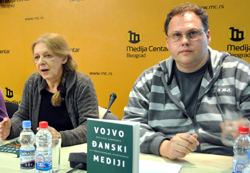
The media in Vojvodina
Chaos, confusion and poverty

More than 70 percent of the media in Vojvodina are facing bankruptcy! This alarming information was recently publicized by the vice president of the Government of Vojvodina and secretary for information of the province, Ana Tomanova-Makanova, clearly demonstrating the catastrophic conditions in local media outlets.
The Independent Journalists' Association of Vojvodina has recently published a book on situation in the media entitled "The Media in Vojvodina – Political Compromise or Professional Reporting", while analyses authored by experts have noted new events in the last year at the media market in Vojvodina. Unfortunately, new events do not necessarily mean positive developments – but to the contrary.
The blockade of privatization has resulted in "two-headed" rule in the media, and such a system invariably leads to losses in private media outlets, which are usually not recognized by local self-governments as acceptable partners for financing of informing in municipalities and cities. Therefore, local self-governments most often fail to fulfill their legal obligation to finance informing of citizens. Some of them have implemented this legal obligation, but interpreted it in their own way: they finance only the "correct" media outlets, those that do not make waves. Local self-governments – like the one in Sombor – sometimes conclude contracts on airing sessions of the local assembly with TV stations that broadcast their programme only within the cable network. Such media outlets do not have a valid license and practically use the existing vacuum in the area of non-regulated cable distribution systems. In the same city, for example, the local power figures have allocated for informing no more than around four million dinars a year. Faced with complaints of insufficient funds for the purpose, their reply is that they have established the Information Department within the city administration, which serves to fulfill their legal obligation on informing the citizens. It is hard to recognize whether this is an example of fatal ignorance or just cynicism. At the same time, Radio Sombor, the only station that has a license for regional broadcasting and airs its programme in four languages, is now facing closure after failed privatization, to which the city administration has not paid attention.

In other municipalities and cities, situation is often very similar, although it may not look that way at the first sight. For example, in Pancevo, the city budget allocates 80 million dinars annually to the media, which sounds excellent. However, out of this sum, 79.7 million is earmarked for RTV Pancevo, while the weekly magazine in Romanian language "Libertatea" receives 300,000 dinars. Other media outlets receive 0 dinars!
The same city is the home of the oldest weekly magazine in the Balkans, "Pancevac", that was once bought for a huge sum of 2.2 million euros by the Markovic family, who have subsequently paid only the first installment in the amount of 300,000 euros but failed to pay the remaining five. The Privatization Agency has terminated the agreement. The Markovic family have left "Pancevac" in ruinous condition. The police and inspectors are investigating the activities of previous owners and the least that can be expected is the bringing of criminal charges. The last example clearly illustrates the fact that the privatization of the media was launched without any corresponding strategy and that media outlets were availably for purchase to anyone, even those who had no desire to actually work in the media field.
Media outlets in minority languages, established by the Assembly of Vojvodina that has later transferred its rights to national minority councils, do not suffer from such serious problems with funding because they are effectively still funded from the budget. However, some of them are exposed to increased political pressure exerted by certain political elites of the minorities, and are plagued by serious problems while trying to preserve a minimum of objectivity. The new Law on National Councils, that has recently served as a basis for council elections, has given the councils an even bigger authority in the media scene, and it remains to be seen what happens next.
Just like in the rest of Serbia, pirate radio stations are widespread in Vojvodina. It is estimated that eight years after the adoption of the Broadcasting Law there are more than 200 pirate stations in the country. For example, a legal radio station, Radio Panda from Kanjiza, which has legally acquired a broadcasting license and pays all the necessary taxes and fees to the government, regulatory bodies and collective organizations, has sent 67 notices to authorities and received no reply! The station has a problem with two pirate broadcasters that cover its frequency. Apart from jamming frequencies of legal broadcasters, pirates do not pay anything to the government nor agencies. They also sell advertising space at ridiculously low prices, destroying the already small marketing revenue in the time of general financial crisis. In Bosnia and Herzegovina, which is not an example of perfect functionality, the issue of pirate broadcasters was solved in a month. It is time for relevant ministries and regulatory agencies in Serbia, whose employees receive substantial salaries, to do something. Or resign from their positions!
Books could be written about the problems facing the media in Vojvodina. Just like in the rest of Serbia, we are anxiously awaiting the draft media strategy that will be prepared with assistance from EU experts. The draft is already late, because it was planned to be completed in May and later delayed for July. However, although the strategy is already ten years late, we will be satisfied if such document finally appears and if opinions of domestic professionals are taken into account.
If this effort is delayed again, it would be another confirmation that politicians in Serbia do not want the media to be strong but impoverished and destroyed. Insolvent media outlets cannot serve as a watchdog of the government, which should be its main role. I am afraid that we are witnesses to "managed chaos" in the media market. After such a chaos, nothing else will remain but blind followers and a legion of unemployed journalists.
Dinko Gruhonjic
MC Newsletter, June 18, 2010
View all comments (0) Leave a comment
Published comments contain opinions that are not the opinions of Media Center. Responsibility for the content of messages and their accuracy lies on the website users who posted them.
 |
| The content of this article does not necessarily reflect the view of the Media Center. The author bear full responsibility for the content of the text. |




